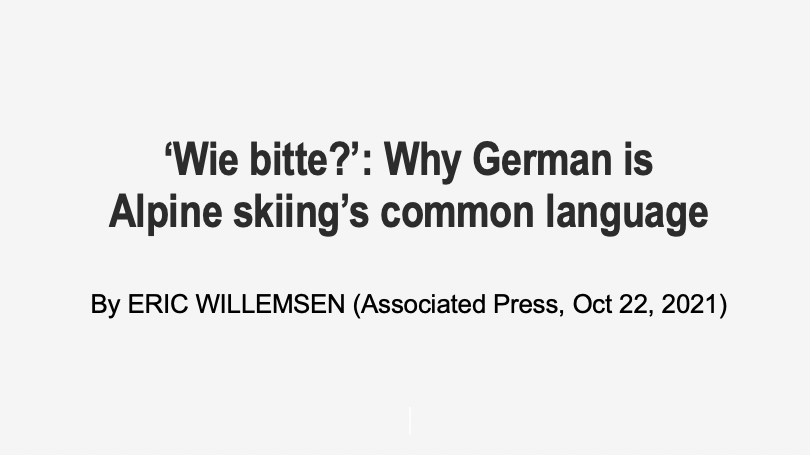
- Undergraduate
- Foreign Study
- Opportunities
- Inclusivity
- News & Events
- People
Back to Top Nav
Back to Top Nav
Back to Top Nav
'Wie bitte?': Why German is
Alpine skiing's common language
By ERIC WILLEMSEN (Associated Press, Oct 22, 2021)
SÖLDEN, Austria (AP) — Skiing greats Lindsey Vonn and Aksel Lund Svindal spoke it fluently during their careers. Current overall World Cup champion Alexis Pinturault has been taking classes for two years. And Olympic downhill champion Sofia Goggia has just started to learn it as well.
German has become the common language of ski racing.
No matter whether they are from the United States, Norway, France, or Italy, a growing number of skiers on the World Cup are learning German — for various reasons.
Some learned the basics of the language in school, like Svindal. However, the Norwegian two-time Olympic and two-time overall World Cup champion only really started speaking it in the early days of his skiing career.
"When I started traveling, I tried to learn German. To be honest, the Alps is the home field of skiing. And in the Alps, you speak mostly German, but also Italian and French," Svindal said Friday in Sölden, where the World Cup season starts this weekend.
"Then I got a technician who could speak English, but he preferred German," Svindal said.
Apart from the practical reason, the Norwegian also had an emotional motivation to speak German.
"You learn the language because you don't want to give the Austrians like home field advantage. I tried to feel at home as well. I wish I had learned Italian and French as well, but I never did. I tried Italian for a while, but I didn't make it work," Svindal said.
In a sport rooted deeply in Central Europe, German is an obvious choice for communication. It is the main language in Germany, Austria, the north-western province of Italy, and the eastern part of Switzerland — an area where ski racing has traditionally been among the most popular sports.
Many top-level coaches and ski technicians, who prepare skis before trainings and races, stem from this region, which each year hosts a large part of the World Cup races.
"Our sport is really important in places where German is (spoken)," Pinturault said. "Also, in Slovenia, Croatia and a little bit in Czech Republic, they can speak German. And that is something really important in our sport."
The Frenchman took German classes for two years.
"It was really important, also because I never got German at school, so just for the basics, especially with my serviceman. And in my team, I have a few Austrians, so I can speak with them in German," Pinturault said.
During a media conference ahead of the start of his title defense this weekend, Pinturault gave three TV interviews within 10 minutes: the first in French, the next in English, and the last one in German.
"It's still not yet perfect, I have to improve, especially in German," he said. "Sometimes a word comes in English when I am talking German."
Getting into German is not always a skier's own preference.
While many members of the Italian ski team are from South Tyrol and have it as their mother tongue, Goggia has to learn it from scratch.
"Ein bisschen," meaning "a little bit," said Goggia when asked about her knowledge of German.
It is her helmet sponsor, an Austrian energy drink company, that wants her to learn the language.
"When you are a Red Bull athlete, you have to speak German," the Italian said.
Still, there are World Cup skiers who refrain from learning German, like Petra Vlhova.
"No, I had it in my school, but I don't know anything. Sorry for the Germans, but I don't like the language too much," said the women's overall champion from Slovakia, who does speak English.
And while she is currently learning another language, it is not German.
"I am trying to learn 'Italiano' because I have many persons in my team from Italy."